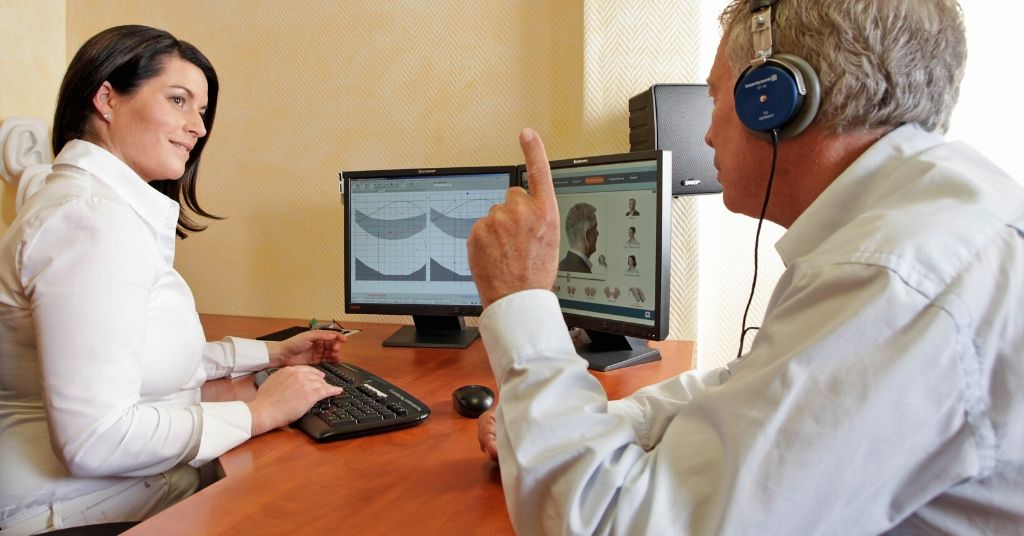
Playing sports with hearing aids no longer a challenge
October 5, 2022
Successful deaf engineer makes great strides
October 14, 2022Mental health, hearing loss, and audiologists

Hearing loss can come with its own frustrations and stressors. These frustrations surrounding hearing loss can thus take a toll on our mental health (MH). With that said, we’re seeing more and more of a connection between emotional health and hearing loss specifically. In light of World Audiologist Day and World Mental Health Day – both of which are today, October 10th. Hearing Like Me talked to Dr. Lilianna Piccinini to gain an audiologist’s perspective on these topics.
The Mental Health and Hearing Loss Connection

Dr. Lilianna Piccinini
You may wonder how hearing loss is connected to our emotions and well-being. Believe it or not, they are actually more connected than we may think. Hearing Like Me asked Dr. Piccinini about some of the ways hearing loss has an impact on mental health. She said hearing loss can dramatically impact the way one interacts with others and experiences life. This can put children and adults at greater risk for developing anxiety and depression.
Hearing loss can dramatically impact the way one interacts with others and experiences life.
“In our practice, we see patients who are unable to participate in life and slowly start isolating themselves from everyone,” she said. “We also see young adults who need help navigating accommodations for school or work, causing then unneeded extra stress and anxiety, when they should be focusing on school or work.”
Digging Deeper: How Hearing Loss Impacts Mental Health
Navigating the challenges in one’s hearing loss journey is unique to each person. There are a myriad of factors involved. Some people may be more affected than others. Since hearing loss changes how we interact with the world, there are a lot of stressors that come with that. We are constantly attempting to adapt to the environment in which we are in, which is usually a hearing world. When we can’t effectively communicate or understand or others can’t adapt to our needs or language, it can create understandable stress and frustration. This may then lead us to feelings of increased anxiety, depression, sadness, loneliness, and wanting to isolate socially to avoid those tough feelings.
On top of that, add stressors like listening fatigue. When we’re exerting so much energy to listen, focus, and process, on top of advocating, and being in the moment; this can take away from other aspects of our life. As a result, we may feel the whole slew of emotions.
Read More: Managing Hearing Loss and Mental Health
The Research on Hearing Loss and Mental Health
Research in the areas of mental health and deafness is evolving every day. For instance, this is an area of research I’ve focused on heavily throughout my psychology studies. Primarily, I’ve examined Adverse Childhood Experiences and trauma among deaf and hard of hearing individuals through my undergraduate thesis. The findings presented strong evidence that individuals with hearing challenges do in fact experience higher rates of trauma and adversity. This can undoubtedly contribute to one’s overall emotional well-being. Again, everyone differs and multiple factors must be considered.
Dr. Piccinini also mentioned a study conducted by John Hopkins which found that mild hearing loss was associated with double the risk for developing dementia. People with severe hearing loss had five times the risk.
Read More: Study: The impact of hearing loss on mental health
An Audiologist’s Role in Hearing Loss and Mental Health
For those with hearing loss who choose to seek hearing care, an audiologist is usually the primary clinician that guides patients on a wide range of aspects pertaining to navigating life with hearing loss. Therefore, audiologists play an important role in guiding and supporting patients through the challenges of coping with some of the mental health implications that come with it. The most common pieces of advice Dr. Piccinini gives to patients is that developing self advocacy skills is extremely important. “Advocating for yourself will increase your quality of life, and overall well-being,” she added.
Find an audiologist via the American Academy of Audiology



